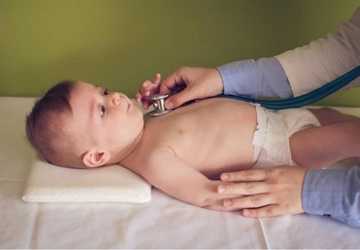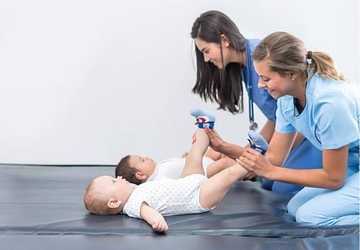Who Needs Baby First Aid Training
First aid instruction is imperative, particularly for those overseeing infants and toddlers. This education arms parents, guardians, and anyone involved in juvenile supervision with the aptitude to handle difficulties with precision and poise. First aid training benefits encompass adeptness in addressing minor afflictions such as abrasions, thermal injuries, and ecchymoses, as well as acute conditions like asphyxiation or unexpected maladies.
- Fundamental capabilities: Emergency resuscitation for neonates, wound care, alleviation of severe allergic episodes.
- Implications: Diminished trepidation in crises, augmented security for progeny.
Identifying the Beneficiaries of Infant First Aid

Although it might seem that first aid training is exclusively pertinent to medical practitioners, a myriad of other groups would profoundly benefit from mastering these competencies:
- Parents: As the principal caretakers, mastering first aid is indispensable.
- Grandparents and kin: Frequently engaged in nurturing roles, making this proficiency essential.
- Childminders and au pairs: Professional custodians must have these skills.
- Pedagogues and childcare facilitators: Anyone tasked with caring for youngsters in a professional milieu must be adept at emergency handling.
Recognizing the importance of first aid training for parents and other custodians ensures they can maintain a safe habitat for minors and respond with adequacy when required.
Enumerating the First Aid Training Benefits
The perks of procuring first aid training are substantial, especially for those tending to infants and younglings. These advantages are not merely confined to the immediate management of emergencies but extend to the prolonged safety and flourishing of children.
- Prophylactic strategies: A comprehensive understanding of first aid also includes preventive tactics to avert mishaps.
- Empowerment: Being educated instils a certainty in adeptly managing dire situations.
- Prompt intervention: Expedient action can often mitigate the severity of a physical or health crisis.
Accentuating the importance of first aid training for parents enables communities to fortify family units' overall resilience and readiness.
Exhaustive Exploration of First Aid Educational Programs
When contemplating first aid training, opting for recognized programs that provide specialized instruction in pediatric and neonatal first aid and CPR is paramount. These curriculums should cover:
- Elemental life sustenance (BLS): Vital techniques crucial for maintaining viability in difficult circumstances.
- Prevalent pediatric conditions: Addressing routine childhood afflictions and physical injuries.
- Tactical emergency responses: Cultivating the ability to assess and act in diverse crisis scenarios.
Specialized Proficiencies Fostered Through Infant First Aid Instruction
First aid training imparts a compendium of specialized competencies specifically tailored to cater to the delicate physiology of infants and toddlers. These capabilities extend beyond immediate crisis intervention to a profound comprehension of pediatric health dynamics, significantly elevating a caregiver's efficacy.
- Techniques for alleviating infant airway obstructions: Detailed manoeuvres differ from those applicable to adults.
- Management of pediatric febrile convulsions: Safely navigating and mitigating risks during a child's explosive episode.
- Proactive environmental hazard prevention: Instruction on crafting secure living and play environments to preemptively thwart accidents.
Sustained Benefits of Proficiency in Pediatric First Aid
Acquiring pediatric first aid skills not only primes individuals for immediate and critical situations but also confers enduring advantages for child care and upbringing.
- Augmented vigilance skills: Caregivers cultivate enhanced perceptiveness toward potential hazards, leading to improved preventative strategies.
- Alleviation of psychological stress: Mastery over emergency protocols diminishes anxiety and stress, fostering a tranquil atmosphere for both progeny and adults.
- Advocacy and leadership within the community: Trained persons often ascend to advocacy and leadership roles in community safety, championing health and emergency preparedness.
Incorporation of First Aid Education into Daily Parental Practices

Embedding first aid training within everyday parenting routines can transform emergency preparedness into an intrinsic aspect of daily care, ensuring that safety measures become instinctual.
- Systematic safety rehearsals: Periodic practice of emergency scenarios with offspring to cultivate awareness and self-assurance.
- Integration of safety pedagogy into daily routines: Educating offspring about the fundamentals of safety in age-appropriate manners to aid their comprehension of their surroundings and potential perils.
- Active participation in community safety initiatives: Engagement in or organization of community safety programs to promote awareness and advocate for widespread first aid training.
Advanced First Aid Instruction: Beyond Foundational Knowledge
For those seeking to deepen their understanding beyond elementary first aid training, advanced courses extensively explore pediatric health emergencies that can further refine caregiving capabilities.
Pediatric advanced life support (PALS) is an intricate course that delves into complex health scenarios and sophisticated resuscitative techniques.
- Focus on special needs: Customized courses that address first aid and emergency care for offspring with specific medical conditions or disabilities.
- Mental health crisis intervention: Training aimed at recognizing and addressing mental health emergencies in children, a vital yet often neglected facet of child care.
Through the continuous enhancement of their knowledge and proficiencies via advanced training, caregivers ensure their preparedness to manage a broader array of situations, ultimately leading to superior care and safeguarding of children.
Integrative Community Programs for Enhanced Child Safety
Developing community-wide programs integrating first aid training into public health initiatives can dramatically increase the overall safety net for children in the community.
- School-based first aid clubs: Implementing programs within schools to teach children basic first aid skills, creating peer educators and advocates for safety.
Community first responder schemes Train community members to act as first responders, significantly reducing the emergency response time in local incidents.
Technological Integration in First Aid Preparedness
Leveraging technology to enhance first-aid training and preparedness can provide cutting-edge solutions to traditional and emerging safety challenges.
Virtual reality simulations: VR can be used to simulate first aid scenarios, providing an immersive learning experience without real-world risks.
- Mobile applications for crisis management: Development of apps that guide laypersons through first aid procedures step-by-step during emergencies.
These advanced strategies not only enrich the foundational knowledge obtained in basic first aid training but also integrate a higher level of expertise and readiness into the daily lives of those responsible for caring for children. Through these specialized programs, communities can ensure that caregivers and children are better equipped to handle emergencies effectively.
Conclusion
The importance of first aid training for parents is indisputable. It represents an essential skill set that every custodian should possess. First aid training benefits the caregiver and the infant by imparting skills necessary to ensure a secure and nurturing environment. Whether one is a parent, grandparent, or professional custodian, comprehending who should learn baby first aid is pivotal in making informed decisions concerning the well-being of children under one's care.





